- Home
- Taylor Caldwell
Great Lion of God Page 3
Great Lion of God Read online
Page 3
Hillel’s heart swelled with passionate exaltation. All exulted in God and acknowledged Him—except man. All obeyed His slightest command implicitly—except man. All lived in beauty—except man. All bowed before Him, existing only in Him—except man. Man was the outlaw, the rebel, the distorted shape that scarred the earth, the voice that silenced the music of Eden, the hand that raised up obscenities and blasphemies. Man was the pariah dog, the moral leper in this translucent mirror of Heaven. He was the muddier of crystal waters, the despoiler of forests, the murderer of the innocent, the challenger against God. He was the assassin of the saints and the prophets, for they spoke of what he would not hear, in the darkness of his spirit.
Hillel preferred to think well of his fellow man, being compassionate and often reflecting on the sorrows and the murky predicament of humanity, but he could not always delude himself that man was worthy to be alive. When he found himself in this crepuscular misery—as he did this evening—a misery mysterious in its source—he would remind himself of the prophecies concerning the Messias, and quote the words of Isaias regarding Him: “He will deliver His people from their sins.”
The few Sadducees whom Hillel knew and whom he welcomed in his house, smilingly laughed at him when he confessed—after an extra cup of wine—that he “felt” something divine had “moved” upon the world, that a powerful event had already taken place which would change the face of history and revitalize man with the Voice of God. “It is your voluntary seclusion,” they would tell him, with fondness. “This world is of rock and substance and the power of Rome, and it is reality, fixed in space, and only madmen deny reality. Abandon the stars, my friend, and the Kabalah, and prophecies made by ancient prophets smelling of dung and goat’s-hair garments and sweat. They lived in a simpler day. Today the world is complex and civilized and filled with great cities and commerce and the arts and the sciences. Man has come of age. He is a sophisticated being, a citizen of the Roman world, at least by existence if not by fiat. He knows all that there is to be known. He is no longer the prey of jejune fantasies and hopes and delusions. He knows what the stars are. He knows what matter is. He knows his place in the universe. He is no longer superstitious, except in a mild manner, like the Romans. He feels no terror for natural phenomena—he understands it. He has his universities, his schools, his wise teachers. Few Jewish maidens there are, these days, who dream of giving birth to the Messias, for they know there will be no Messias, and that that delusion was only the wistfulness of innocent, ancient men. We still honor those men’s childish wisdom, and find it remarkable, considering that they had no access to our libraries and our schools. But it was the wisdom of most ingenuous men, who knew nothing of the cities and the roaring world of today.”
“A virgin shall give birth—” But no one spoke of that these days, except a few old Pharisees among Hillel’s friends, and even they spoke of it as an event still shrouded in time and possibly only a mystical hope. Hillel felt alone. At midnight, he found himself pondering on his peculiar surety that something had, indeed, moved on the face of the world and that all creation was holding its breath.
Once Hillel said to an old man whom he honored in Tarsus, an old Jew bent with years but with the mind of a leaping youth, “I have heard from my female cousin in Jerusalem, who is—I do not regret to say—married to a burly Roman centurion. A good man; I have dined in his house; he adores my cousin and defers to her, which, in some minds makes him less a man, but I have never believed that it was a proof of manhood to despise women. In many ways he possesses a rough wit and much shrewdness, and contrary to popular belief that all Romans are monsters, he is very kindly and has much humor.” Hillel spoke diffidently, while his guest frowned at this doubtless exaggerated view of the Roman conquerors of God’s Holy Land.
“He is also superstitious,” Hillel continued. “He had been married to Hannah for six years, but God had not seen fit to bless them with a son though they have four rosy little daughters and I long for such, myself. This was a sore sorrow to Hannah, though Aulus seemed singularly and happily resigned. However, four years ago, after the winter solstice when the Romans were celebrating their boisterous Saturnalia even in Jerusalem—they are restrained, however, on command of Caesar Augustus who is a sensible man—Hannah gave birth to a son. Aulus was consoling some of his men in a watchtower high over Jerusalem, for they, that night, were on duty and could not join the final night of the festivities, which he assured me are the most—pleasant—of all. It was a fine cold night, and Aulus was gazing in the direction of Bethlehem, the birthplace of King David, and all the stars were sharply visible.”
Hillel had glanced apologetically at his old visitor who was accepting more wine from a slave and who revealed traces of ennui. Candidly, he was yawning.
“A messenger came to Aulus to tell him of the birth of his first son, and Aulus immediately poured wine for his bereft men and declared a festivity of their own in the tower. He was partaking of his third goblet of wine when he chanced to glance in the direction again of Bethlehem, and then he saw a most amazing thing.”
“He was drunk,” said the guest. “I know these Romans. They are always drunk.”
Hillel was a little vexed. “Was it not David who said, ‘Oil to make the countenance shine, and wine to make the heart of man glad?’ He counted these as excellent gifts of God, and not to be rejected. Aulus is a prudent man. I have seen him drunk but five times.”
The guest snorted. “There are abjurations in the Holy Books against drunkenness. There is the case of Noë. What does your friend know of Noë?”
Hillel said, “I was not speaking of Noë. Aulus looked at the bright cold sky over Bethlehem on its hills and he saw a most remarkable sight. Among the stars was a star such as men have never seen before, brilliant and huge as a full moon and restless, turning and burning with a white fire, and moving as if with purpose.”
Your Aulus was indeed drunk, or he had observed what the astrologers call a nova—a new star. It is a phenomenon not unusual.”
“Stars do not destroy themselves in one burst of flame in a twinkling,” said Hillel, with a light flush on his fair cheek at this dismissal of his exciting story. “And if a nova appears, it is at least visible on successive nights for a considerable time. It is true that the star endured for a number of days, and then disappeared, but not in a fading or diminishing. It ended abruptly as if its mission was accomplished. For, you see, my dear old friend, it ceased its movements on that first night and remained suspended like a mighty cluster of great stars over a certain spot. It remained fixed, vivid and unchanging, at rest, until it disappeared as quickly as it had appeared. I heard that the light of it was so powerful and intense that it cast shadows as defined as full moonlight on the earth, and occasioned much awe and fear in the surrounding country.”
“I, too,” said the guest, shrugging, “have relatives in Jerusalem, and they did not see this astonishing star.”
“It was midnight, or later,” said Hillel, “and how many are there now among men who lift their eyes from the world and consider the stars?”
“True,” said the guest.
“Aulus was convinced that a great hero had been born,” said Hillel, “a great warrior, though he doubted that this had occurred in Bethlehem, a poor little farming and market town. Hannah, on being told of this by her husband, declared it heralded the birth of their son.”
The guest raised exasperated eyes to the ornate ceiling of the dining room, and groaned, “The fantasies of women! Now your revered young cousin will declare she gave birth to the Messias!”
“No,” said Hillel, still somewhat vexed, but smiling now. “Hannah is not so vainglorious, and she has also known a man. She is inclined to believe in a prophet though not in one of Aulus’ heroes.”
“There must have been several thousand infants born on that night in Jerusalem and Bethlehem,” said the guest. “Who is the prophet, or the hero?”
Hillel stared at his folded hands, which he w
as resting on the white linen of the dining cloth. “I do not know,” he murmured. “But when I received Hannah’s letter a most mysterious joy seized me, an exaltation, and this I do not understand. It was as if an angel had touched me.”
The guest chortled rustily and shook his head. “I have heard from your father and your grandfather, Hillel ben Borush, that you were always a mystical boy, and that you implored to be introduced to the hidden wisdom of the Kabalah. It is my opinion that this was a mistake, and I trust you will forgive me. It is only the calm and detached mind which should be introduced to the Kabalah, the cold if thoughtful mind, and perhaps even the skeptical, but of a certainty not the emotional and susceptible.”
Hillel had been angered at this dryly amused dismissal of his story and so had changed the subject. He had also felt foolish and demeaned. He spoke of it no longer to anyone. But he thought frequently of the star. Some fear, some reticence, had prevented him from writing others in Jerusalem about the star, notably his relatives, for he did not wish to be disillusioned. This also surprised him, for he was a man who deplored illusions in others and had a gentle disdain for them.
But it had been prophesied ages ago that the Messias, of the House of David, Himself, would be born in Bethlehem. However, if this were so, why had there been no shouting angels, no universal trumpets of the heavens, when that star had appeared, and why had not the world been swept up in rejoicing splendor? The Messias should surely not be born in obscurity, for His throne was on holy Sion, as the prophecies related, and He would not be born as the least of men, the Kings of Kings. Too, several years had passed, and there had been no other sign.
Still, Hillel could not forget the star, though he often wondered at the convulsion of emotion which had seized his heart on reading Hannah’s letter. Even to this very evening in his garden the surge of mysterious rapture was as fresh and urgent as ever. It may all have been but a delusion, the fantasy of drunken men in a Roman tower who had observed it, or a wife’s ardent desire that her first-born son be duly recorded by Heaven. But still, his stubborn and devoted heart denied all this, and he did not know why. Perhaps, he thought, an illusion which affirms joy is better than a reality which denies it, or perhaps the presence of joy attests to its verity.
As Hillel stood in his garden tonight he heard a sudden loud cry, and he started. The cry broke the smiling silence like an abrupt command, sharp and authoritative. It was not for a few moments that he realized that it was the voice of his little son, passing in the arms of a nursemaid through the colonnade. Still, he was shaken. The infant’s voice had reminded him of his own father, imperious and uncompromising and firm, even didactic, impervious to doubt, scornful of hesitation. It was absurd, he thought, as the silence was resumed. A mere suckling—and the formidable old man who had ruled his household with the mere power of his appalling voice! For one moment Hillel contemplated the thought that his father had been reincarnated in infant Saul, and then he chuckled. How delightful it would be to smack the buttocks of a soul which had terrorized wife and sons and daughters in its former life! Perhaps, in a measure, that would be justice. He returned to his prayers, and now even the noisy birds were still. He repeated the words of David, with deep longing and reverent joy:
“Oh God, You are my God! Early will I seek You, my soul thirsts for You, my flesh longs for You in a dry and thirsty land, where no water is. To see Your power and Your glory, as I have seen You in the sanctuary! Because Your lovingkindness is better than life, my lips will praise You, and thus will I bless You while I live. I will lift up my hands in Your Name!”
He looked now at the fanged mountain shapes far beyond the valley, the fantastic monuments which acute imagination could distort into the likenesses of monsters, of lurking dragons, of bastions and towers and spires and temples, of pediments and columns standing alone, of twisted arches and carved walls—all hewn of scarlet stone seemingly burning in direful fire against a sky of the most intense incandescent blue. The setting sun thrust them into frightful relief so that they appeared to be marching on the rich valley land in menace and terror, striking the river Cydnus into the semblance of a wide highway of flame. Hillel had seen this a thousand times or more, but it never failed to fill him with a premonition, an amorphous fear, a heavy melancholy of soul.
Now he heard Deborah chattering with her female Greek and Roman friends, and her voice was vivacious and trilling, the voice of a happy and complacent child. He shook his head a little as if in reproof, but in some way that trivial and lighthearted sound consoled him, and he knew not why he was consoled. He looked below the mountains now and saw Tarsus on the blazing river, a city of broken golden fragments struck with crimson. He had not been born in that city, but had come to it as a child with his parents. Yet he loved it as he did not love Jerusalem, the desecrated, the alien, the lost, the land not only occupied by military conquerors but, worse still, occupied by sons who had destroyed the heart of the holy city out of wantonness and casual cynicism and faithlessness and abandon. When a city was poor it was occupied by faith and industry and hope. When it became rich and affluent evil entered, and the city was lost.
“How have I mourned thee, Jerusalem,” Hillel murmured and entered his house with his head bent and his sadness on him again.
“I assured you, Deborah,” a young Roman matron was saying to her hostess in the calm of the brilliant evening, “that the medal from Delphi would cause you to conceive a son.”
“I wear it next to my heart,” said Deborah bas Shebua. She hesitated. “Still, he could have been of a more comely countenance.”
Chapter 2
HILLEL BEN BOBUSH, was entertaining guests at dinner. There was his old severe and Pharisee friend, Rabbi Isaac ben Ezekiel, and his brother-in-law, brother of Deborah, the luxurious gentleman and aristocrat from Jerusalem, David ben Shebua. At the foot of the long golden draped table sat Deborah, the modern woman who would not be confined to the women’s quarters in spite of Rabbi Isaac’s overt disapproval—she thought him a dull somewhat dirty old man—and young Saul’s tutor, the Greek Aristo, and Saul, himself, now five years old. She knew that her presence, the pagan Greek’s presence, and even the presence of the child, were resented, deplored and despised by the old rabbi, and this gave her a sensation of childish malice and amusement. As for Aristo, he was a Greek of discernment, for all he was a freedman, and he appreciated her qualities of mind and her sensibility to Greek poetry, and her knowledge of the arts and sciences.
The sun was setting, the dreadful and distorted fanged mountains rearing in scarlet beyond the open doors and windows of the dining room, the peacocks were screeching, and the hot air was heavy with the scent of flowers and dust and heated stone. Deborah could hear the newly loud pattering of the fountains, the mutter of stirring trees. She could see the green of lush grass beyond the portico, the dark pointed towers of cypresses and the purple blossoms of the myrtles. She was proud and content. Her house might not be the largest in this suburb, or the most splendid, but it was a work of art and taste. The dining room was spacious and square, of splendid proportions, with a floor of yellow and black marble squares, like gold and ebony, the murals on the white walls were excellent if a little “extreme” in Hillel’s conservative opinion, and the plastered ceiling was decorated in rosettes of gold and deep blue. The furniture, the chests and screens and tables and chairs, had been fashioned in the Eastern manner to be consistent with the environment, and were of lemonwood and dark ebony and teak, elaborately carved and inlaid. Here and there were scattered bright Persian rugs of intricate pattern and delicate hue. A fresh breeze moved through the pillars of the portico and brought with it a pure country aroma. Now the bells of “heathen” temples dedicated to Serapis, Juno, Aphrodite and all the gods and goddesses of the Roman, Greek and Oriental pantheon, began to ring softly over the land, striving with each other for harmonious notes, blending together to create a background of sweet and nostalgic sound. Deborah sighed happily. Her pretty face was suffused
with a glow of combined innocence and complacent pride—and stupidity—and Hillel glanced down the long table at her and loved her anew, and wondered, as he often wondered, why she did not bore him to death.
Deborah’s brother, David, was, in Hillel’s opinion—which could be very acerbic at times—effete, ridiculous, pretentious and a parody of elegance. He was four years older then Deborah, and married to a Roman girl of a great house, and he lived more in Rome than he did in Jerusalem, and called himself “an emancipated Jew, the new Jew.” He was an intimate friend of Herod, himself, and a familiar at the court, and very rich. He had fine manners and graces, and was handsome, of Deborah’s auburn and blue coloring of hair and eyes, and beardless, of course, and fair of complexion with a Greek nose of which he was tediously proud, and a cleft white chin, and his figure was another source of his pride, for he was tall and slender. He was also too fastidious, in Hillel’s conviction, and scented like a woman, and wore many rings on his long and delicate hands. A complicated and detailed Egyptian necklace, fringed and jeweled, hung about his neck and lay on his chest. Gemmed bracelets clasped his upper arms, and a jeweled earring sparkled in one ear, and his toga was of the whitest and most shimmering silk bordered with gold, and his sandals glittered.
Hillel always tried to despise him as a decayed traitor to his race and his God, but David was so charming, so amusing, so smiling, and even so erudite, that Hillel invariably and helplessly was seduced into fondness for him on his infrequent visits to this house. David, certainly, was a Sadducee and therefore even worse than an uninformed heathen, but he was a scholar, equally at home in discussing the Torah, Philo, Euripides, Sophocles, Virgil and Homer, the latest scandals from Rome and Jerusalem and Alexandria and Athens, politics, poetry, the sciences, the stock market and banking, the state of the drachma and sesterce, the newest favorite of Caesar Augustus, the Augustales of Rome, rumors from the Palatine, architecture, archaeology, trade, commerce, and religion in all its forms, not to mention the latest fashions in living, clothing, dining and amusement.

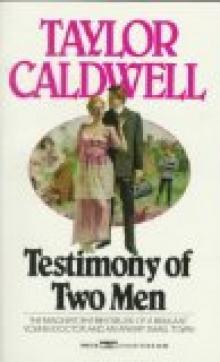 Testimony of Two Men
Testimony of Two Men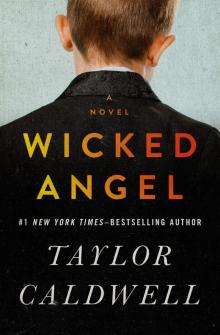 Wicked Angel
Wicked Angel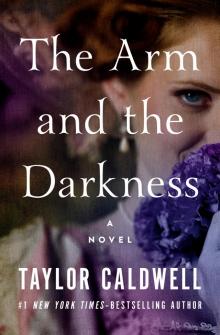 The Arm and the Darkness
The Arm and the Darkness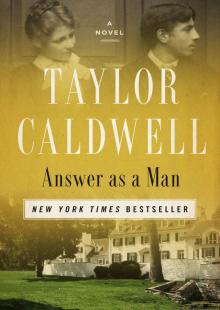 Answer as a Man
Answer as a Man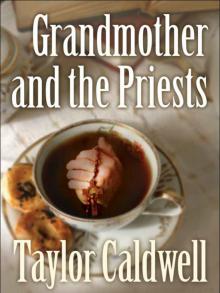 Grandmother and the Priests
Grandmother and the Priests On Growing Up Tough: An Irreverent Memoir
On Growing Up Tough: An Irreverent Memoir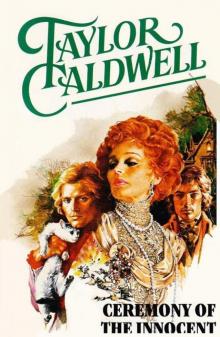 Ceremony of the Innocent
Ceremony of the Innocent The Listener
The Listener Bright Flows the River
Bright Flows the River The Earth Is the Lord's
The Earth Is the Lord's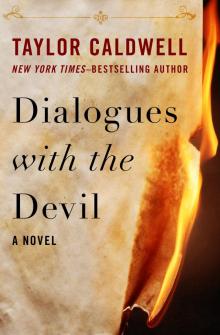 Dialogues With the Devil
Dialogues With the Devil A Tender Victory
A Tender Victory This Side of Innocence
This Side of Innocence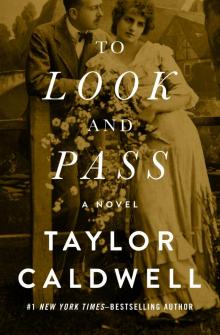 To Look and Pass
To Look and Pass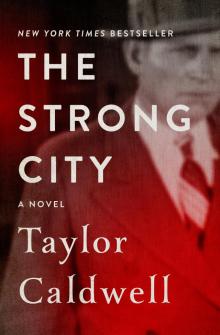 The Strong City
The Strong City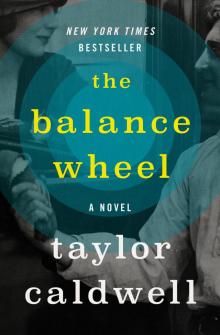 Balance Wheel
Balance Wheel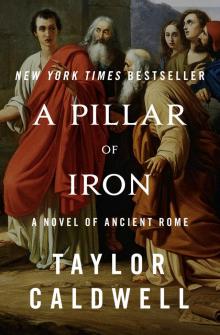 A Pillar of Iron: A Novel of Ancient Rome
A Pillar of Iron: A Novel of Ancient Rome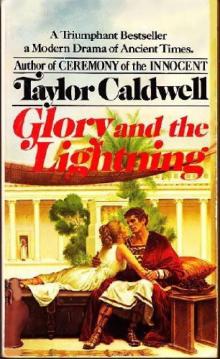 Glory and the Lightning
Glory and the Lightning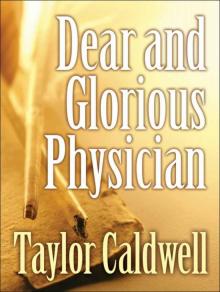 Dear and Glorious Physician
Dear and Glorious Physician The Wide House
The Wide House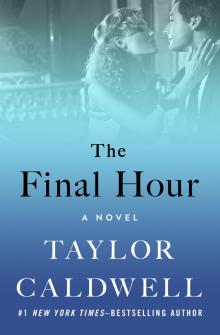 The Final Hour
The Final Hour Never Victorious, Never Defeated
Never Victorious, Never Defeated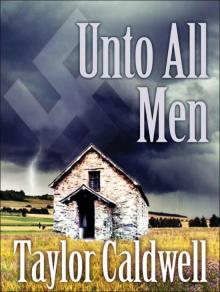 Unto All Men
Unto All Men The Turnbulls
The Turnbulls Your Sins and Mine: The Terrifying Fable of a World Without Faith
Your Sins and Mine: The Terrifying Fable of a World Without Faith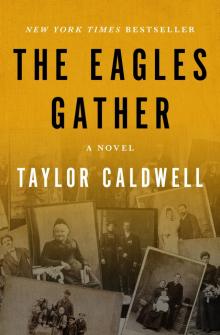 The Eagles Gather
The Eagles Gather Let Love Come Last
Let Love Come Last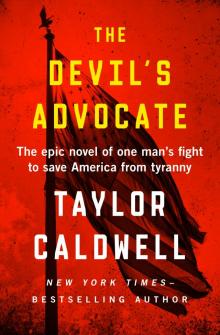 The Devil's Advocate: The Epic Novel of One Man's Fight to Save America From Tyranny
The Devil's Advocate: The Epic Novel of One Man's Fight to Save America From Tyranny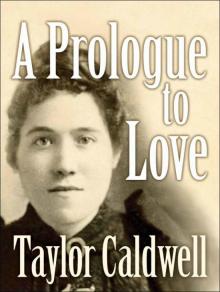 A Prologue to Love
A Prologue to Love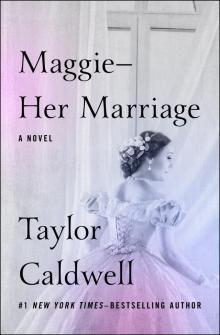 Maggie: Her Marriage
Maggie: Her Marriage The Late Clara Beame
The Late Clara Beame Melissa
Melissa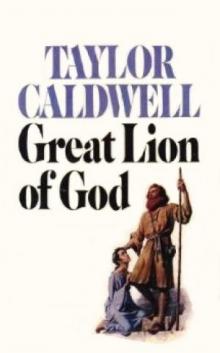 Great Lion of God
Great Lion of God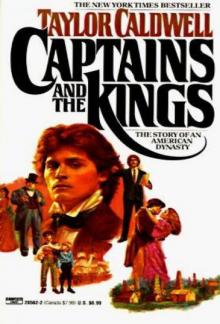 Captains and the Kings
Captains and the Kings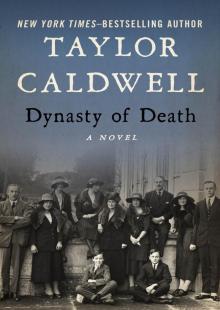 Dynasty of Death
Dynasty of Death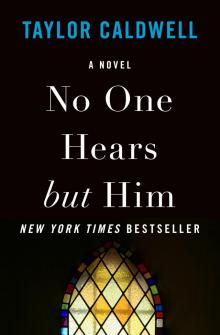 No One Hears but Him
No One Hears but Him The Sound of Thunder
The Sound of Thunder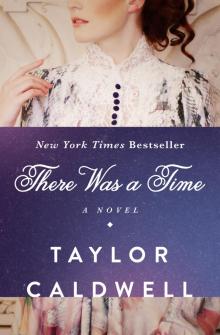 There Was a Time
There Was a Time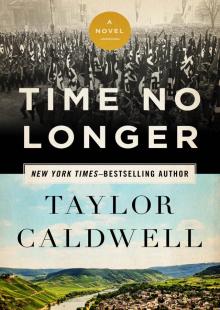 Time No Longer
Time No Longer I, Judas
I, Judas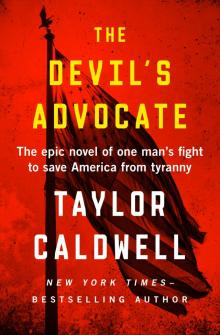 The Devil's Advocate
The Devil's Advocate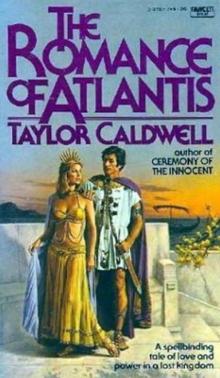 The Romance of Atlantis
The Romance of Atlantis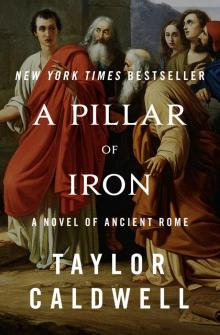 A Pillar of Iron
A Pillar of Iron On Growing Up Tough
On Growing Up Tough Your Sins and Mine
Your Sins and Mine